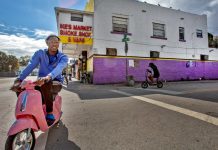|
Getting your Trinity Audio player ready...
|
 “Don’t cry, don’t raise your eye. It’s only teenage wasteland” –
“Don’t cry, don’t raise your eye. It’s only teenage wasteland” –
Baba O’Riley, The Who
Imagine if these campus protestors learned how and why to protest in middle school.
Do the Gen Z pro-Palestine student protesters fully know what they’re screaming, yelling, and encamping about? Nope.
Could they have been more educated, thus making their protests meaningful to their purpose? Yep.
Of course, disruptive protests bring attention to an issue; that’s why they’re done. But in a world driven by optics, they’re seen as nothing more than lawlessness.
We all saw signs like “Dykes 4 Divest,” “Gays for Gaza,” “Trans People 4 Palestine” and “Lesbians for Liberation.” Wouldn’t you think that these Ivy Leaguers would know that merely being gay in Gaza can amount to ten years of prison time, according to Human Rights Watch?
International politics are complicated, yet Gen Z has appointed themselves as experts before graduating from college or bothering to learn the nuances of the conflict.
SAY WHAT?
Most believe most students chanting “Intifada Revolution” and “From the River to the Sea” don’t understand what they’re implying.
When a Berkeley political science professor polled students about the latter chant, he found that while 86 percent of students said they supported the chant to some degree, just 47 percent of those supportive students could correctly name the river and the sea in question. The most popular incorrect rivers were the Nile and the Euphrates. The most common “seas” include the Atlantic, an ocean, the Dead Sea, a lake, and the Caribbean.
At least it is a sea.
CREAMY, CHUNKY, OR ORGANIC
At Columbia, they pitched North Face tents, ate lots of PB&Js, and participated in silent interpretive dance.
Is this a fight for justice — or a grasp for relevance and likes?
As a result, we’ve churned out a generation seemingly more activated than educated.
Except, thanks to social media, they’re also indoctrinated — and woefully misinformed, too.
But imagine if all of the energy put into the recent campus protests was put towards the world’s most significant issues and not just the “it shouldn’t have to happen to you to matter to you” mindset.
What if students had to do meaningful “activism hours” instead of primarily self-serving “community service hours” strictly amassed for college applications? That would mean physically showing up for issues of importance to impact a human being somewhere in the world.
BIG SELECTION
These can include top-of-the-line horrific humanitarian refugee issues such as those playing out in Afghanistan, the Democratic Republic of the Congo, Syria, Yemen, Ethiopia, Niger, Sudan, Somalia, Mali, Myanmar (Burma and Rohingya), Burkina Faso, South Sudan, Haiti, Ukraine.
Then, suppose those are different from your cup of tea, or you want something with more social media appeal. In that case, you always have the mainstream global/local crisis issues such as poverty, healthcare, youth/adult mental health, hunger and food insecurity, gun violence, climate change, gender equality, human rights, immigration, pollution, child and youth online safety, reproductive rights, animal rights, water scarcity, censorship, book bans, access education access, racial injustice, immigration, income gap and a bunch I haven’t listed. The point is that there is something for everyone.
These issues make excellent protest material. And we desperately need the energy, time, commitment, effort, organization, and passion displayed in these campus protests for these other matters. The question remains: If you care so much for humanity, why don’t you demonstrate for the other issues? Is it just YOUR humanity?
WHY YOU NEED TO TEACH PROTEST
There needs to be a school curriculum block on activism. It’s not just to teach kids how to protest effectively but rather another platform of what we’re attempting to do in the classroom— getting them to think a bit deeper. We aren’t just talking about skills or knowledge. This isn’t putting together a concise response or clever tweet. It’s about being capable of contributing to public discourse; we need kids to hold particular intellectual virtues and values.
Let’s go back to basics, though. What’s the overused point of education? “It’s to prepare children for life.”
HELP
Our education systems have many tasks—to make children work-ready and develop their personhood, allow them to engage in society, and help them flourish. Many don’t realize that learning to be a citizen isn’t localized to the curriculum.
Interactions with parents, teachers, and each other, as well as news and social media—all contribute to being citizens of the planet. Given the tasks at hand, a planet that needs lots of help and seems beyond proper repair.
But all is not lost as the protests did produce a single moment of kindness.
Back at Columbia, a picture of the PB&J station blew up the internet with a sign in all caps warning students with allergies that they were in the NutZone. That was very thoughtful.
And then there was the Pro-Hamas student holding a sign encouraging Hamas to kill Jewish Students singing Hatikva (“The Hope”). That was not very thoughtful.
This column is by Ritchie Lucas, Founder/CEO of the non-profit The Student Success Project. He can be reached by email at ritchie@studentsuccessproject.org and on Facebook as The Student Success Project.
ABOUT US:
For more Miami community news, look no further than Miami Community Newspapers. This Miami online group of newspapers covers a variety of topics about the local community and beyond. Miami’s Community Newspapers offers daily news, online resources, podcasts and other multimedia content to keep readers informed. With topics ranging from local news to community events, Miami’s Community Newspapers is the ideal source for staying up to date with the latest news and happenings in the area.
This family-owned media company publishes more than a dozen neighborhood publications, magazines, special sections on their websites, newsletters, as well as distributing them in print throughout Miami Dade County from Aventura, Sunny Isles Beach, Miami Beach, Coral Gables, Brickell, Coconut Grove, Pinecrest, South Miami, Kendall, Palmetto Bay, Cutler Bay and Homestead. Each online publication and print editions provide comprehensive coverage of local news, events, business updates, lifestyle features, and local initiatives within its respective community.
Additionally, the newspaper has exclusive Miami community podcasts, providing listeners with an in-depth look into Miami’s culture. Whether you’re looking for local Miami news, or podcasts, Miami’s Community Newspapers has you covered. For more information, be sure to check out: https://communitynewspapers.com.
If you have any questions, feel free to email Michael@communitynewspapers.com or Grant@communitynewspapers.com.





